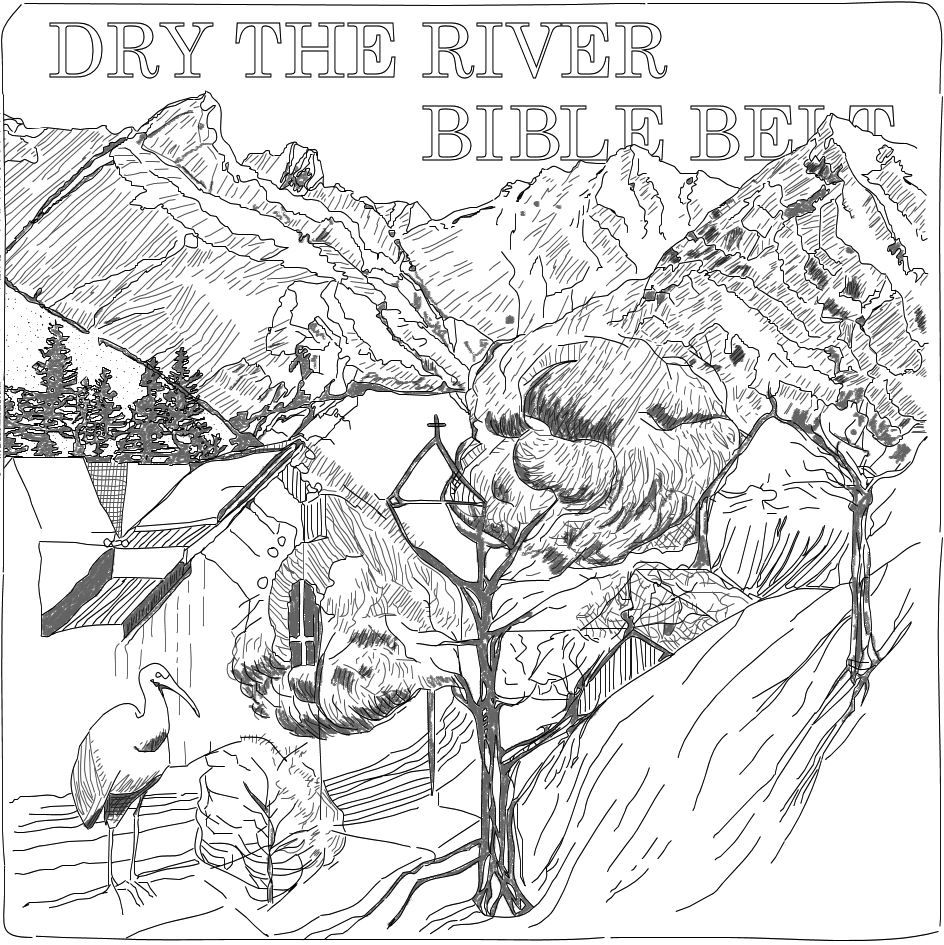As much as I wanted to dismiss comparisons to Noah & the Whale, Dry the River do seem to mirror their London counterparts in a certain respect. On their second EP, the band has taken a somewhat gloomier path to creation compared to the jauntier songs on The Chambers & The Valves. If The Chambers that was the sound of them wanting to break free from the restraints of expectant and restricting parents then Bible Belt is the sound of them giving up and accepting the situation their family ties have put them in.
I should say though that the EP isn’t as morose as the likes of the lyrical matter on The First Days Of Spring which was just the sound of Charlie Fink trying to make sense of being single once again and not really coming to any sort of overwhelming conclusion or finding any real revelation at the end of it all. Bible Belt is more centred around tales of old homely times where people might travel around in wagons and where (rather predictably) family is the centre of it all. The EP begins with the image of two young people being married as their families gather and celebrate the occasion. The song continues, telling of how illness strikes down the new wife and how the husband struggles to keep himself “steady”. “In the morning I’m light/ in the evening I’m heavy” he sings, letting the doubt seep through. Perhaps the desire to break free isn’t completely gone but there’s not any real redemption lyrically or musically to suggest a happier ending, implying that he stuck the marriage out until the end, or at least until his wife died.
There seems to be a desire from the band to make grand statements with their work but once again, after listening through the EP I’m left with the unfavourable feeling that the message to be taken from these songs has flown over me. On “Weights & Measures” they put forth their most obvious sentiment: “I was prepared to love you/ I never expect anything of you”. The adolescent rejected teenage in us all can relate to such a line but I recall being quite astounded with the full effects this chorus had when I saw the band live last year. However on the EP, despite their best efforts to give the line its fullest effect with thoughtful halts in the music, the result feels like it falls short and is never as climactic as they wanted it to be.
Personally I feel inclined to put this down to the mixing of the EP. Here the drums are put much more to the back of the tracks and what was before a driving force for the music is now easy enough to ignore when listening. On “History Book” from The Chambers EP, the drums were the essential part of the song, helping the bobbing rhythm flow along, making the song a delightful listen. On their reworked version on Bible Belt, the same can’t be said. The pace of the song is decreased which does suit considering the different context but it’s lost all it warm charm and the climaxing layering of vocal melodies feel almost forced and laboured as opposed to fun and fresh.
There is some progress though, even if the steps are small and not likely noticeable at first. The band treat the EP as a whole here, letting tracks seep into one another which makes listening through a more wholesome experience while also deterring the view that single tracks are merely being compiled and stuck together. There’s also the introduction of some new instruments, most notably a violin. When it does appear it admittedly doesn’t do a great deal – played as the band stop playing their other instruments and go for a moment’s reflection in their lyrics, like in the first chorus of “History Book”. But on “Family Tree” the pizzicato is what makes up the main body of music when “Family Tree” changes key during its bridge. It’s welcoming to see the band actively engaging with the wider range of sounds an instrument can make instead of just adding it in for clichéd dramatic effect.
Nonetheless, the same troubles still lie about in the music. I still feel like I should be getting more from listening to their music and they still sound like their waiting for the magic touch to come along and bring the right kind of life to their music. Or perhaps the band are aware of these issues but choose to play it safe. On the final title track an accordion hums quietly, like the last dying embers of a fire as a guitar rhythm ticks away on top of it. With lyrics of drinking and suicidal parents, one can’t help but think of Neutral Milk Hotel’s “King of Carrot Flowers”. But as the song reaches its end (a climax that can both feel unsatisfying and reassuring) the lyrics “the trick of it is/ don’t be afraid anymore” crop up. It’s any oddly resonant line that finishes the song itself quite well but also leaves me with the idea that he band are holding themselves back, thus why everything feels a little restrained. Perhaps then the band might do well to follow this advice and act on their own whims, not confining themselves to any sort of expectations they might feel people have about them. Sometimes it can be great to hear a band break free. And if they do, I promise I won’t tell their parents.

